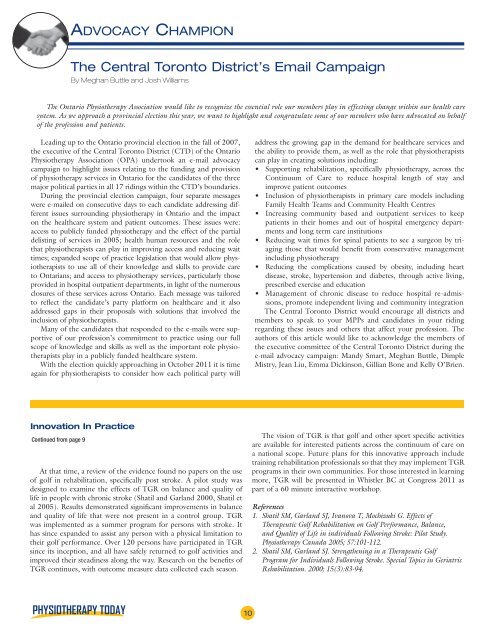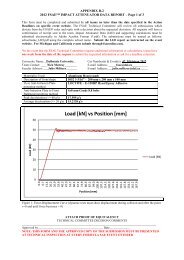2011 APTEI Acupuncture & Dry Needling (ADN) Program
2011 APTEI Acupuncture & Dry Needling (ADN) Program
2011 APTEI Acupuncture & Dry Needling (ADN) Program
Create successful ePaper yourself
Turn your PDF publications into a flip-book with our unique Google optimized e-Paper software.
advOCaCy ChaMpIOn<br />
The Central Toronto District’s Email Campaign<br />
By Meghan Buttle and Josh Williams<br />
The Ontario Physiotherapy Association would like to recognize the essential role our members play in effecting change within our health care<br />
system. As we approach a provincial election this year, we want to highlight and congratulate some of our members who have advocated on behalf<br />
of the profession and patients.<br />
Leading up to the Ontario provincial election in the fall of 2007,<br />
the executive of the Central Toronto District (CTD) of the Ontario<br />
Physiotherapy Association (OPA) undertook an e-mail advocacy<br />
campaign to highlight issues relating to the funding and provision<br />
of physiotherapy services in Ontario for the candidates of the three<br />
major political parties in all 17 ridings within the CTD’s boundaries.<br />
During the provincial election campaign, four separate messages<br />
were e-mailed on consecutive days to each candidate addressing different<br />
issues surrounding physiotherapy in Ontario and the impact<br />
on the healthcare system and patient outcomes. These issues were:<br />
access to publicly funded physiotherapy and the effect of the partial<br />
delisting of services in 2005; health human resources and the role<br />
that physiotherapists can play in improving access and reducing wait<br />
times; expanded scope of practice legislation that would allow physiotherapists<br />
to use all of their knowledge and skills to provide care<br />
to Ontarians; and access to physiotherapy services, particularly those<br />
provided in hospital outpatient departments, in light of the numerous<br />
closures of these services across Ontario. Each message was tailored<br />
to reflect the candidate’s party platform on healthcare and it also<br />
addressed gaps in their proposals with solutions that involved the<br />
inclusion of physiotherapists.<br />
Many of the candidates that responded to the e-mails were supportive<br />
of our profession’s commitment to practice using our full<br />
scope of knowledge and skills as well as the important role physiotherapists<br />
play in a publicly funded healthcare system.<br />
With the election quickly approaching in October <strong>2011</strong> it is time<br />
again for physiotherapists to consider how each political party will<br />
Innovation In Practice<br />
Continued from page 9<br />
At that time, a review of the evidence found no papers on the use<br />
of golf in rehabilitation, specifically post stroke. A pilot study was<br />
designed to examine the effects of TGR on balance and quality of<br />
life in people with chronic stroke (Shatil and Garland 2000, Shatil et<br />
al 2005). Results demonstrated significant improvements in balance<br />
and quality of life that were not present in a control group. TGR<br />
was implemented as a summer program for persons with stroke. It<br />
has since expanded to assist any person with a physical limitation to<br />
their golf performance. Over 120 persons have participated in TGR<br />
since its inception, and all have safely returned to golf activities and<br />
improved their steadiness along the way. Research on the benefits of<br />
TGR continues, with outcome measure data collected each season.<br />
10<br />
address the growing gap in the demand for healthcare services and<br />
the ability to provide them, as well as the role that physiotherapists<br />
can play in creating solutions including:<br />
• Supporting rehabilitation, specifically physiotherapy, across the<br />
Continuum of Care to reduce hospital length of stay and<br />
improve patient outcomes<br />
• Inclusion of physiotherapists in primary care models including<br />
Family Health Teams and Community Health Centres<br />
• Increasing community based and outpatient services to keep<br />
patients in their homes and out of hospital emergency departments<br />
and long term care institutions<br />
• Reducing wait times for spinal patients to see a surgeon by triaging<br />
those that would benefit from conservative management<br />
including physiotherapy<br />
• Reducing the complications caused by obesity, including heart<br />
disease, stroke, hypertension and diabetes, through active living,<br />
prescribed exercise and education<br />
• Management of chronic disease to reduce hospital re-admissions,<br />
promote independent living and community integration<br />
The Central Toronto District would encourage all districts and<br />
members to speak to your MPPs and candidates in your riding<br />
regarding these issues and others that affect your profession. The<br />
authors of this article would like to acknowledge the members of<br />
the executive committee of the Central Toronto District during the<br />
e-mail advocacy campaign: Mandy Smart, Meghan Buttle, Dimple<br />
Mistry, Jean Liu, Emma Dickinson, Gillian Bone and Kelly O’Brien.<br />
The vision of TGR is that golf and other sport specific activities<br />
are available for interested patients across the continuum of care on<br />
a national scope. Future plans for this innovative approach include<br />
training rehabilitation professionals so that they may implement TGR<br />
programs in their own communities. For those interested in learning<br />
more, TGR will be presented in Whistler BC at Congress <strong>2011</strong> as<br />
part of a 60 minute interactive workshop.<br />
References<br />
1. Shatil SM, Garland SJ, Ivanova T, Mochizuki G. Effects of<br />
Therapeutic Golf Rehabilitation on Golf Performance, Balance,<br />
and Quality of Life in individuals Following Stroke: Pilot Study.<br />
Physiotherapy Canada 2005; 57:101-112.<br />
2. Shatil SM, Garland SJ. Strengthening in a Therapeutic Golf<br />
<strong>Program</strong> for Individuals Following Stroke. Special Topics in Geriatric<br />
Rehabilitation. 2000; 15(3):83-94.



